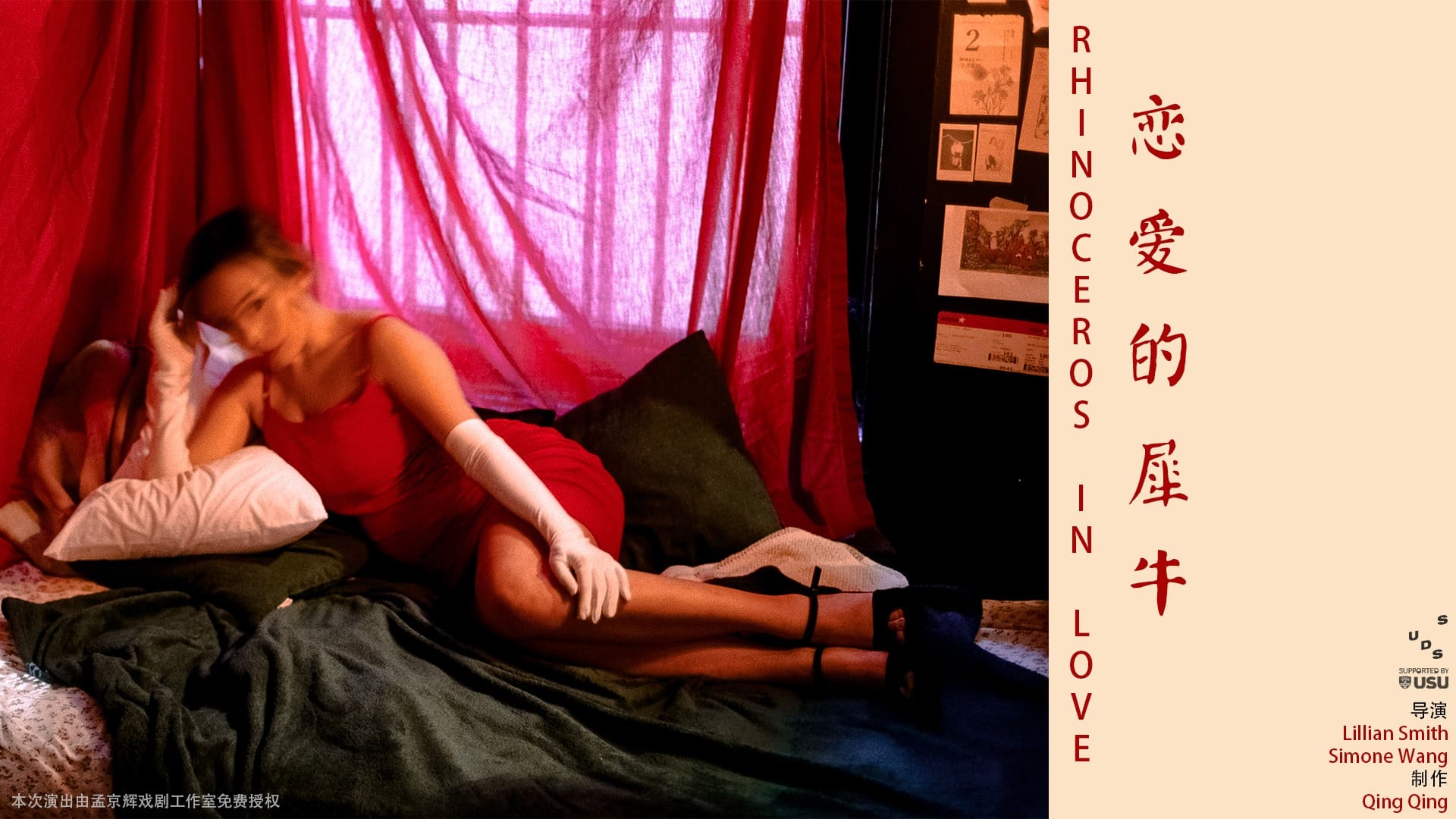When was the last time you saw a Chinese play? Never? Same here! But lucky for us, SUDS is currently presenting “Rhinoceros in Love” – a contemporary Chinese play written by Liao Yimei in 1999 about a zookeeper who falls in love with his next door neighbour. But while “contemporary Chinese” would suggest the play is about the social upheaval and political turmoil that has characterised China in the past century, “Rhinoceros in Love” is a much more subtle, implicit examination of modern China, so much so that you’d be forgiven for thinking that it was an English language play readapted to a Chinese setting (and not the other way around). While there is nothing distinctly Chinese about the story, Lillian Smith’s direction elegantly draws on China’s rich theatrical tradition to create a powerfully raw dramatic experience. And what an experience it is.
It’s hard to fully describe “Rhinoceros in Love.” Indeed, the play doesn’t give the audience the comfort of having everything explained. Instead, it throws us right in the deep end, presenting us with moments and images whose significance we’ll only later realise. Part sitcom comedy, part emotional BDSM, and part absurdist psychodrama, “Rhinoceros in Love” takes the audience on a whirlwind journey of emotions filled with stark tonal shifts that would normally make a play too exhausting to watch. But, thanks to the amazingly strong performances, while “Rhinoceros in Love” definitely leaves us feeling drained by the end, never will it leave you feeling disengaged. A testament to the talent of the actors, and the director’s intuition in casting them, every single role was a highlight. The supporting trio of Toothbrush, Heizi and Daxian (played respectively by Katherine Porritt-Fraser, Thulitha Senavirathne and Joel Gray) all capture an effervescent cynicism we see all the time in sitcoms (the ones about a group of late twenty year olds living in New York with a seemingly endless amount of free time). The three bounce off one another so effortlessly that you can’t help but think the actors probably do exactly the same even when they’re not on stage. Joining the comedic firepower of the play is Rachel Seeto as Honghong and Ellie Tilse as Lily. Reflecting just how unusual the play is, it’s hard to explain the nature of these characters, but one thing for sure – they’re probably some of the funniest ones to have ever been written for the stage. Seeto in particular must be commended on how well she captured the bombastic, daytime-tv-soap-melodramatic colour of Honghong. Also to be commended is the show’s use of song and music. Headed by Jeffrey Khoo and Chloe Watts, this production provides not only powerful images, but also moments of musical beauty which adds to the play’s overall mood.
Up until this point, it does appear that “Rhinoceros in Love” is mainly a comedy. And in many ways, that would be correct. But the comedy is ultimately a sideshow to the dark heart of the story – the romance between Malu (Frank Yang) and Mingming (Karen Leong). By all measures, Malu has traits which we would now term to be “incelesque,” but Yang’s soul-searing portrayal manages to evoke a strange sense of pity for the love-tormented zookeeper. Even in moments as brutish anger, Yang still channels a certain fragility in his performance, as if his anger, like his sense-of-self, is ultimately still at the mercy of the woman who has scorned him. These outbursts of rage become more frequent as his unrequited love for Mingming begins to erode his sympathetic veneer and reveal something far more sinister, and Yang evokes this degradation with terrifying abandon. Likewise, Leong exudes a sultry, smoky sensuality as Mingming which she uses to dominate Yang’s Malu for the majority of the play. But hidden under her capriciousness is a woman deeply wrought by her own insecurities, cruelly inflicted upon her by her love for another man who brutally mistreats her. Leong moves around the set like a cobra, circling around her prey, seemingly taking a perverse enjoyment in seeing its anguish. And just like a cobra, when threatened, she amplifies herself in both volume and physicality. But we the audience can’t help but think – how much of it is just bravado? In the face of an increasing toxic masculinity, how far can she go before he breaks?
That’s probably the question underlying all of Malu and Mingming’s scenes. While each is exquisitely acted with an obvious chemistry (even when they’re at each other’s throats), if there’s one criticism with the direction, it’s that these scenes all tended to follow the same path, with the same energy and character dynamics. No matter how amazing Yang and Leong were, towards the end, it did feel like we were watching the same, powerfully acted duologue for the fifth or sixth time, each iteration less impactful than the last.
That said, the relationship between the two takes on a bone chilling twist towards the end. When the comedy and the drama begin to collide, we are not left with black comedy, but an unrelenting grimness where humour cannot possibly exist – even the comedic roles we’ve grown to trust as a respite from the play’s heavier themes begin to morph into something far more terrifying. While only a few scenes earlier was the audience laughing, now we’re silent, before a loud gasp at the final climax. A truly horrifying end, “Rhinoceros in Love” will make you question for hours to come what exactly you’ve just watched, but isn’t that the whole point of good theatre?





